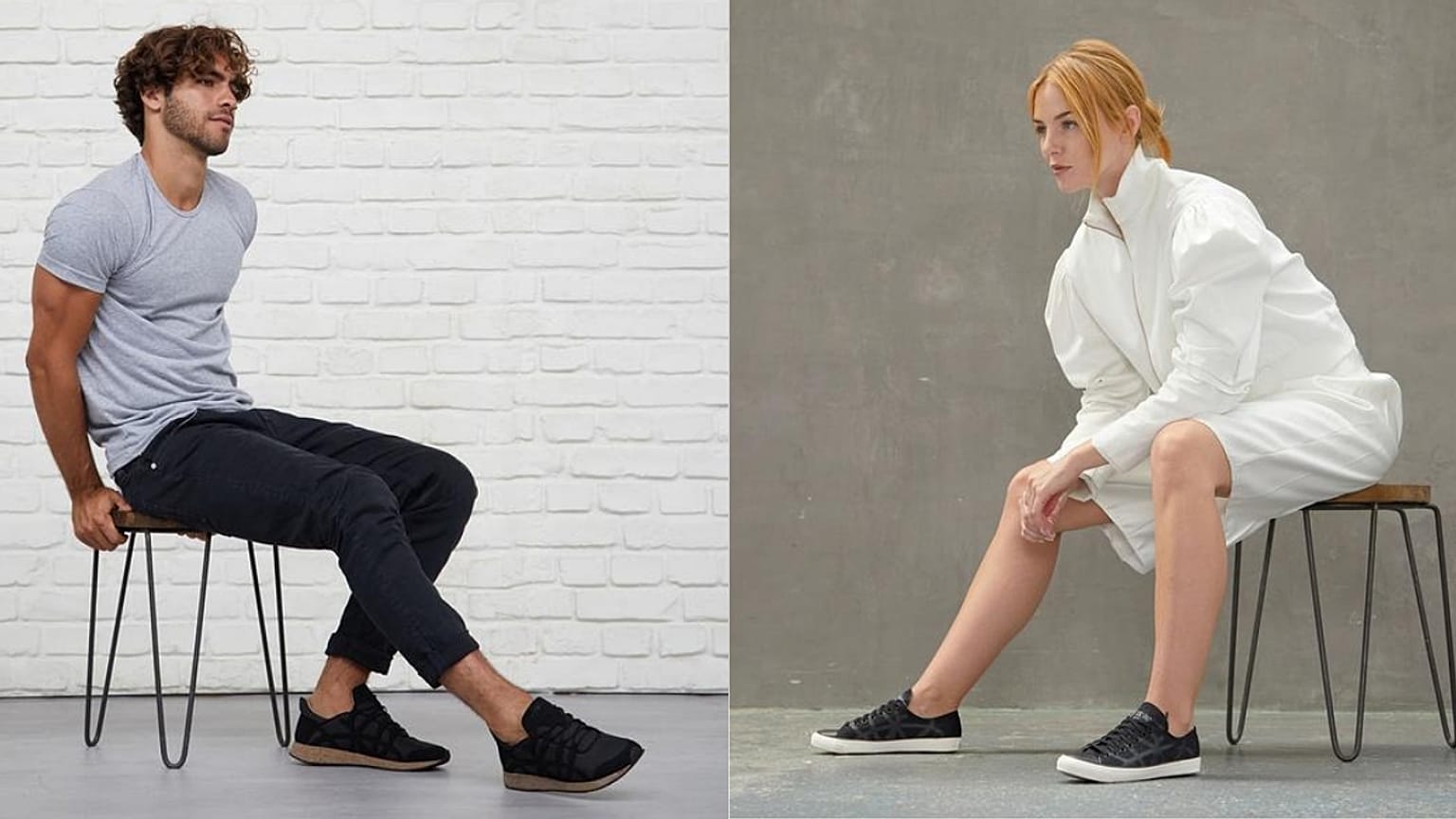Our interview with Sven Segal, founder of PO-ZU.
In the mid-noughties, shoe designer Sven Segal found himself at a crossroads. More than a decade of experience in the busy production lines of mainstream brands had confirmed his passion for smart, design-savvy footwear. Simultaneously, he was disheartened. The underpinning business models were fast, furious and oversaturated. As a result, factories used harmful chemicals excessively to accelerate the design process – a practice that gave Segal a head full of glue fumes and thoughts of change.
The result of that internal conflict is Po-Zu, an award-winning cruelty-free footwear brand founded by Segal in 2006. It launched with a range of biodegradable house slippers. “I thought that people would care most about avoiding toxic substances within their household – we even made compostable shoeboxes that doubled-up as seed-trays!” explains Segal. Since then, the brand has gone on to be ranked the UK’s Number 1 Ethical Shoe Brand.
Crafted from all-natural, Fair Trade materials such as rubber, pinatex (pineapple leaf fibre) and cork, Po-Zu’s range offers reasonably priced, ethically-made alternatives to mass-produced vulcanised sneakers from big-name labels. The shoes are made in Sri Lanka, whose local supply chain provides Po-Zu with Fair Trade rubber and coconut husk, and Portugal, chosen on account of its shoemaking heritage.
Entering a challenging market “under-financed, understaffed and under-resourced” was tough, and Segal stresses that building the brand has been a “a long iterative process with many bumps in the road”. But he is optimistic for the future, noting “a growing trend and awareness of the negative impacts of fast fashion businesses” and a new wave of “emerging pioneers trailblazing alternative ingenious solutions”.
Here, Segal discusses early struggles, the best natural fibres – and why fast fashion is approaching its sell-by date.
What inspired you to set Po-Zu in 2006?
“The inception was the outcome of discovering the dark side of the shoe industry while working as a shoe designer for mainstream brands for over a decade. The unnecessary extensive use of harmful chemicals just for the sake of speeding up processes and increasing profit are just horrendous. I couldn’t stand contributing towards those bad practices and just had to start my own brand and make shoes the way I think should be made, with respect to factory workers and the environment.”
Tell us about the brand name…
“Po-Zu means ‘pause’ in Japanese – as in pause fast fashion, chill out and slip into something more comfortable – and the logo is based on an old Japanese crest.”
What have been the biggest challenges in growing the brand?
“As a designer I didn’t have a clue about what it takes to run and grow a company. Sourcing sustainable materials a decade ago was like finding a needle in a haystack. Being under-financed, understaffed and under-resourced, whilst competing in an extremely uneven playing field is pretty challenging.”
Which materials are central to Po-Zu and where do you source them from?
“We use Fair Trade natural rubber for our soles and coconut fibre for our Foot-Mattress, both of which are sourced in Sri Lanka. We use organic cotton for the uppers and linings from India. Pinatex (pineapple leave fibre) from the Philippines. Linen, wool, and cork from the EU.”
We’re especially interested in Po-Zu’s use of cork, where is yours sourced from and how is it used in the designs?
“Our cork is sourced from Portugal, we use it for different parts of the shoe uppers, and some sneakers are made entirely from cork. We also launched a new runner type sole recently which is make from cork too. It provides a great bounce and insulation, and I love the fact that it’s a renewable resource.”
Which Po-Zu sneaker models are bestsellers?
“Our Sri Lankan Sneakers, probably because they are the most affordable, ethically-made alternatives to the mass-produced vulcanised sneakers like Converse and Vans.”
You have production operations in Portugal and Sri Lanka, why those locations in particular?
“I initially chose Portugal because, firstly, I had good contacts there. Secondly, they have fantastic shoemaking know-how, and thirdly, I wanted a European based production. We chose Sri Lanka because of the unique supply chain where we locally source both the Fair Trade rubber and the coconut husk.”
What are your methods for ensuring ethical practice is sustained throughout the production line?
“You need to be really focused on working in partnership with the people who make your shoes. It’s as much about educating and working together to get to an end result as anything. We see our factories as our business partners who share in our success. You can see our ethical conduct charter here https://po-zu.com/pages/environmental-and-ethical-conduct-charter.”
Who or what is exciting you in the world of sustainable fashion right now?
“It’s easy for journalists to focus on ethical fashion brands who are already making a big noise, but it’s so exciting to see so many new emerging brands coming forward too. You will find them at the makers markets or on platforms like Common Objective.
In comparison to these cool emerging brands, fast fashion feels so boring. It’s unsustainable, uninspired and growing old. New emerging pioneers are trailblazing alternative ingenious solutions and doing it more effectively than ever before.”
Documentaries like Stacey Dooley’s Fashion’s Dirty Secrets have helped to shine a light on the ethical issues synonymous with fast fashion. In your years in operation, what changes have you noticed in consumer behaviour?
“We were excited to be a part of Stacey Dooley’s documentary. It shows a growing trend and awareness of the negative impacts of fast fashion businesses and being on BBC1 is a great place to help people understand. With movements like Fashion Revolution we’re gradually seeing a shift, but we need policy to back it up. This is why the UK Gov Environmental Audit Committee is so important for the fashion industry. We need to drive policy forward at government level in order to create systemic change.”
What are your top tips for consumers wanting to shop more sustainably in 2019?
“Always ask yourself – do I really need this? Then, do I really love it? Has it been made with respect to the people and the planet? Will it last? There are many ways you can create beautiful things without buying something new. Visit a charity shop for instance, fix the things you already have, make something new yourself. If you love it, care for it and find a home for it; you are creating a cycle within fashion which is not ordinarily there.”
What new for Po-Zu in 2019?
“We are planning some exciting new developments with vegan fibres to extend our current vegan mainline range. We can’t quite say what they are yet but we think our vegan fans will be delighted with the new developments.”
Writer: Mary-Jane Wiltsher


















